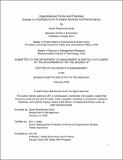Organizational Forms and Practices: Essays on Implications for Frontline Workers and Performance
Author(s)
Scott, Karen MacKenzie
DownloadThesis PDF (3.345Mb)
Advisor
Kelly, Erin L.
Terms of use
Metadata
Show full item recordAbstract
In three essays, this dissertation explores how organizational forms and workforce practices shape frontline work experiences and organizational performance. Using both quantitative and qualitative methods, I explore how frontline workers experience work and what factors shape their performance. In the first essay, I examine how workforce practices in nursing homes relate to organizational performance. Specifically, I evaluate performance on resident health outcomes for both pre-pandemic and COVID-19 conditions. Combining Federal and state administrative data sets with non-public data on early COVID-19 spread and mortality, I investigate the degree to which the organization of work for frontline workers predicted resident health as a measure of organizational performance for nursing homes. In a period of global stress on health and care systems, I seek to understand to what extent prepandemic predictors of performance remained important. When nurses spent more time with residents, residents experienced better care both before and during the pandemic. Yet contrary to expectation, the role of clinical outsourcing became more relevant during the pandemic, potentially reflecting greater workforce flexibility or targeted COVID-19 workforce support to facilities that outsourced nursing activities before the pandemic. These results depict how environmental changes and alternative performance measures call into question established relationships in the high-performance work systems literature. In the second essay, I use in-depth interviews and field observations to uncover the process of constructing ownership culture in an employee-owned firm. I demonstrate how workers co-create their own control system, supported by a high financial value of ownership, strategic managerial communication, peer pressure, and performance management. This critical case challenges the dominant view in the employee-ownership literature that success requires formal worker participation in decision-making. Further, it investigates the “black box” of culture-building in an employee-owned firm. The third essay builds on this understanding by evaluating the stated motives of individual worker-owners in a home care cooperative. The cooperative developed as a pilot initiative with non-profit partners to develop a home care organization that would provide quality jobs and quality care, while integrating immigrant workers. I traced the workers’ justifications for joining and participating in these cooperatives. Rather than aligning with expected motives from previous studies or with Worker Center motives, I find that these workers adapted motives to reflect their realities, such as multiple jobs and a lack of labor rights in practice. This analysis emphasizes the decoupling of workers’ experiences from stated organizational goals, emphasizing the importance of collecting workers’ perspectives. Taken together, these three essays contribute insights into how frontline workers shape organizational performance by interpreting organizational context, culture, and structure. Results indicate that organizational performance is not merely a function of workplace practices, but rather, directly influenced by frontline workers based on their individual motives and roles in workplace culture. These findings imply that by directly engaging with frontline workers’ motives, organizational leaders and policymakers can design organizations that improve work and performance.
Date issued
2025-02Department
Sloan School of ManagementPublisher
Massachusetts Institute of Technology